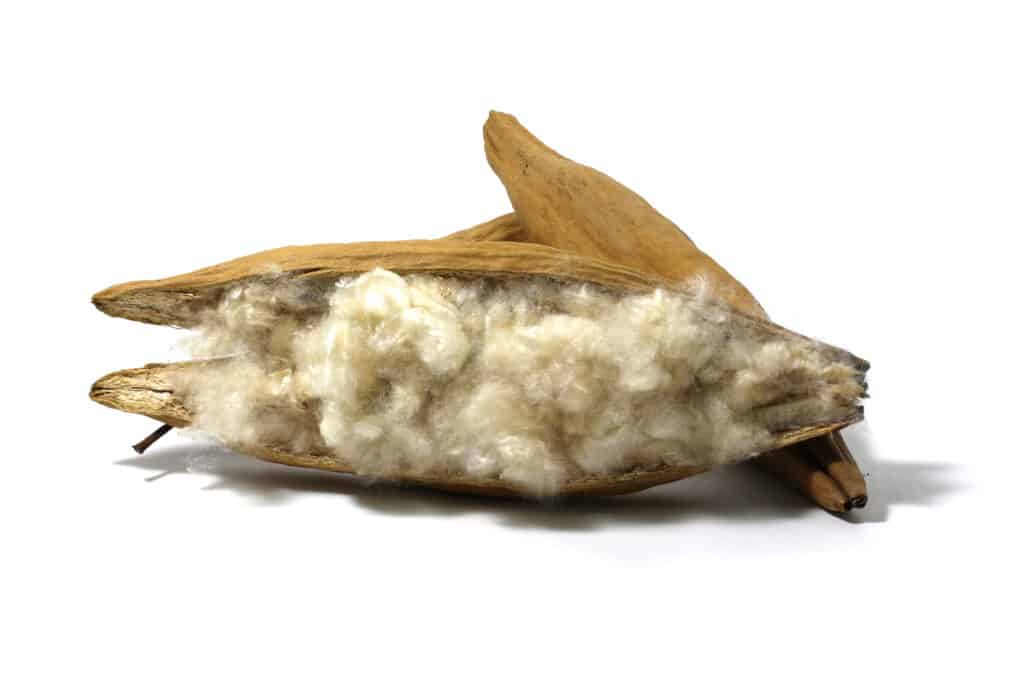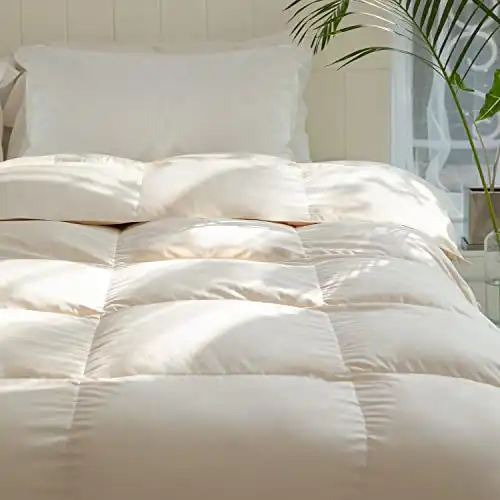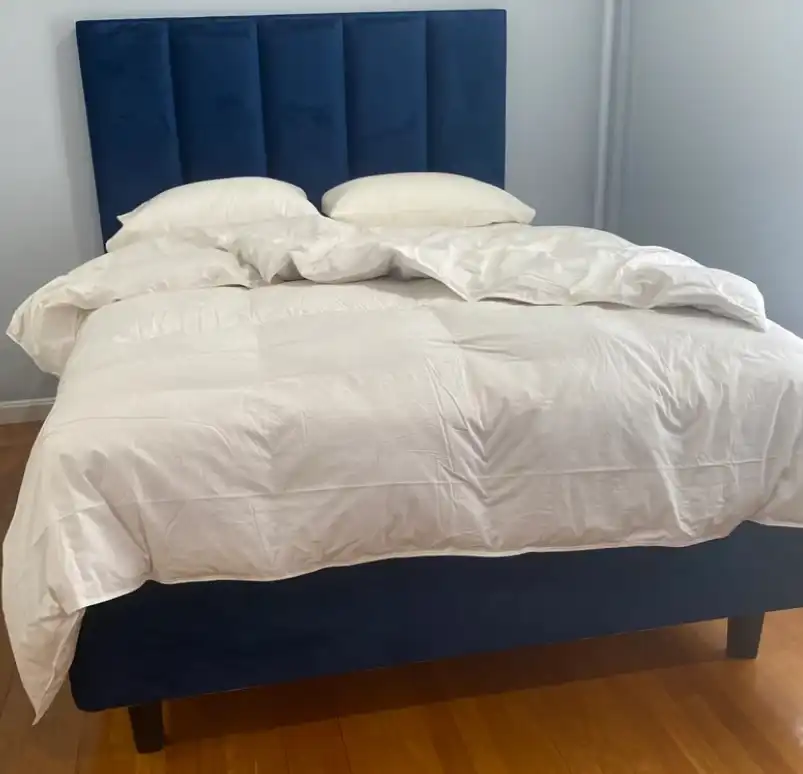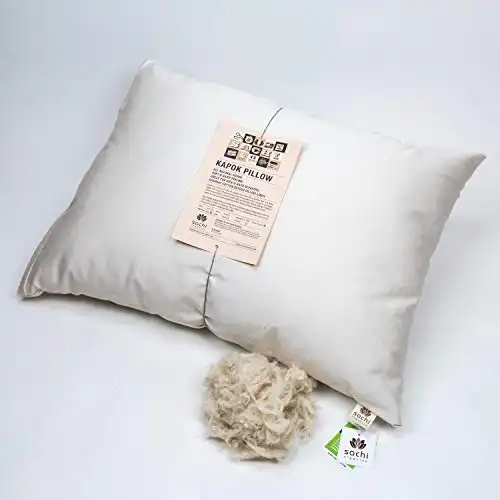- You are here:
- Home »
- Organic Bedding »
- Top 3 Kapok Comforters for a Perfect Night’s Sleep
Top 3 Kapok Comforters for a Perfect Night’s Sleep
Disclaimer: As an Amazon Associate I earn from qualifying purchases.
Kapok comforters are luxurious, lightweight comforters made from natural kapok fibers, making them hypoallergenic and naturally resistant to dust mites. Kapok is also one of the most sustainable materials available, so your purchase helps support environmentally friendly practices.
In this guide, we’ll discuss everything you need to know about choosing and caring for a Kapok comforter, including how they differ from other types of bedding items. With our help, you can find the perfect comforter that will provide comfort and relaxation night after night.
Rewardown Kapok Down Comforter
This comforter combines comfort with sustainability. It’s made with a blend of 70% recycled white down and 30% kapok, giving it a soft and luxurious feel.
The delicate fabric used in the duvet makes less noise, which may be helpful for light sleepers or those who struggle with falling asleep. It also has good moisture absorption and breathability, allowing for a comfortable and refreshing sleep experience.
This duvet has been certified as safe, healthy, and skin-friendly by Standard 100 by OEKO-TEX. The end-to-end box stitching keeps the fill evenly distributed throughout the night, preventing clumps. The 8 inner loops prevent the duvet from sliding around inside the duvet shell, ensuring you stay comfortable all night.
Overall, the Rewardown Kapok Down Duvet is a good option for anyone who wants a comfortable, sustainable bedding product.
Islamorada Kapok Comforter
This kapok comforter is a high-quality product crafted in Canada in a BSCI factory. This means that it is made under ethical and sustainable conditions, with a system in place to improve the working conditions in its supply chain. The outer fabric of the comforter is made of 100% cotton and is Okeo-Tex 100-certified, ensuring that it is safe for human use and eco-friendly.
The duvet is designed to be an all-season product, using Grade A silky kapok fiber and locked baffle box construction to provide optimal warmth and comfort. It also features sewn-in corner loops for attaching to a duvet cover, and each piece is made to order.
Lastly, the Islamorada Comforter comes with a 10-year warranty on workmanship, giving you peace of mind that you are investing in a quality product that is built to last.
Brooks Brothers Kapok and Cotton Comforter
This natural duvet insert is made with 100% cotton fabric, making it a highly breathable and comfortable option for all seasons.
The filling is a 50/50 blend of kapok and cotton, which offers a perfect balance of support and softness. The kapok fibers provide loft and warmth, while the cotton fibers add extra softness and help regulate body temperature. This combination makes for a cozy and comfortable sleeping experience that will keep you warm and snug throughout the night.
Lastly, Brooks Brothers Kapok Comforter is made in Turkey, a country known for its exceptional textile production. This means that you can trust the craftsmanship and attention to detail that went into making this product, ensuring that it will provide you with years of comfortable and restful sleep.
What Is Kapok?
Kapok is a natural fiber from the kapok tree’s seed pods, also known as Ceiba pentandra. The kapok tree is a large tropical tree that can grow up to 200 feet tall and is native to Central and South America and parts of Africa and Asia. The fiber is light, fluffy, and has a silky texture.
It is often used as a filling for pillows, mattresses, and comforters because of its hypoallergenic properties and ability to wick away moisture. The kapok tree is also considered to be a sustainable resource as it requires no fertilizers or pesticides to grow, making it an environmentally friendly alternative to synthetic materials.

Read More: Top 12 Kapok Pillows
Kapok Comforters Pros and Cons
Before making a purchase, it’s important to consider the pros and cons of kapok comforters.
Pros:
- Eco-friendly: They are made from the fibers of the kapok tree, which is a renewable resource. It requires no pesticides or fertilizers to grow, making it an environmentally sustainable choice.
- Hypoallergenic: Kapok fibers are naturally hypoallergenic and resistant to dust mites, making it a great choice for people with allergies or asthma.
- Lightweight: They are lightweight, making them perfect for warmer climates or for those who prefer a lighter covering while sleeping.
- Moisture-wicking: Kapok fibers are naturally moisture-wicking, meaning they can help keep you cool and dry throughout the night.
Cons:
- Cost: They are often more expensive than other types of comforters due to the rarity of the kapok tree and the labor-intensive process of extracting the fibers.
- Durability: Kapok fibers are not as durable as other materials like down or synthetic fibers, which means the duvet may not last as long.
- Flattening: Kapok fibers have a tendency to flatten over time, which can lead to a loss of loft and warmth in the comforter.
- Limited availability: They may not be as widely available as other types of comforters, making them harder to find and purchase.
- Washing: They should only be dry cleaned, as washing them with water can cause the kapok fibers to break down.
|
$449.00
|
$365
|
$198
|
$92.00
|
How Do Kapok Comforters Compare to Wool Comforters?
Kapok and wool comforters are natural, eco-friendly bedding options with unique qualities. Here are some ways in which kapok duvets compare to wool duvets:
- Warmth: Wool is generally considered to be a warmer option than kapok due to its density and ability to trap heat. Kapok is a lightweight and breathable fiber, so it may be a better option for people who tend to sleep hot or live in warmer climates.
- Hypoallergenic properties: Both kapok and wool are naturally hypoallergenic, making them great options for people with allergies or asthma.
- Sustainability: Kapok is considered to be a more sustainable resource than wool because it requires no fertilizers or pesticides to grow, and the trees are grown in tropical regions where they can help support biodiversity. Wool, on the other hand, requires land, water, and energy resources to produce.
- Cost: Wool comforters are generally more expensive than kapok comforters because wool is a more labor-intensive material to produce.
- Durability: Wool is more durable than kapok and can last many years with proper care. Kapok fibers, while resilient, are not as durable as wool and may flatten over time.
Overall, kapok and wool comforters have unique benefits and drawbacks. It ultimately comes down to personal preference, sleeping habits, and budget.
How Do Kapok Comforters Compare to Synthetic Comforters?
Kapok and synthetic comforters, such as down alternatives, are different types of bedding materials with unique qualities. Here are some ways in which kapok comforters compare to synthetic duvets:
- Warmth: Synthetic comforters can be made to different warmth levels depending on the type and amount of synthetic filling used, while kapok comforters are naturally lightweight and may be better for warmer climates or people who tend to sleep hot.
- Hypoallergenic properties: Kapok is a natural, hypoallergenic material, while synthetic comforters can sometimes contain chemicals that may cause allergies or skin irritations.
- Breathability: Kapok is a breathable material that helps wick away moisture, while some synthetic materials may trap heat and moisture, leading to discomfort and sleep disturbances.
- Sustainability: Kapok is an environmentally friendly material harvested from the kapok tree’s seed pods, which requires no fertilizers or pesticides to grow. On the other hand, synthetic materials are made from non-renewable resources like oil and may take hundreds of years to decompose in landfills.
- Durability: Synthetic comforters are generally more durable than kapok duvets, which may flatten over time and require more frequent replacement.
- Cost: Synthetic comforters are generally less expensive than kapok comforters, making them a good option for people on a budget.
Read More: Best GOTS-certified Duvet Inserts
Tips for Buying the Perfect Kapok Duvet:
Here are some tips for finding the perfect kapok duvet:
- Look for an Oeko-Tex-certified comforter: This certification ensures that the comforter is safe for use and free of harmful substances.
- Check the stitching: The comforter should have box stitching to prevent the kapok from shifting and clumping in certain areas. This ensures that the comforter maintains its loft and warmth evenly throughout.
- Look for inner loops: Inner loops are handy in keeping the comforter in place inside a duvet cover. They help to prevent the comforter from shifting around and clumping up.
- Choose the right size: Kapok comforters come in different sizes, so make sure to choose the one that fits your bed properly.
- Check the thread count: A higher thread count indicates that the comforter is made with a finer, softer fabric, which can add to the comfort and durability of the comforter.
- Read reviews: Reading reviews from other customers can give you a good idea of the quality and durability of the comforter you are considering.
By following these tips, you can be confident in choosing the best kapok comforter for your needs.
Read More: Top 6 Eucalyptus Comforters for Summer
FAQs
How do I care for my kapok duvet insert?
Kapok comforters should be spot-cleaned when necessary and can be dry-cleaned for deep cleaning. Avoid washing your comforter with water, as it may break down the fibers and reduce its lifespan.
Are kapok comforters safe?
Yes, kapok comforters are made from natural fibers that are free of toxins and chemicals, making them a safe choice for people with allergies or asthma. Their breathable nature makes them a good choice for children and people who tend to sleep hot.
Does a kapok comforter need a duvet cover?
Yes, using a duvet cover over your kapok comforter is recommended to protect its fibers and keep it clean. It also helps to add an extra layer of warmth. Be sure to use organic duvet covers made from natural fibers such as cotton or bamboo.
Will a kapok comforter flatten over time?
Yes, kapok comforters may flatten over time, so it is important to fluff them regularly in order to keep the fibers lofty and full. This will also help maintain its insulation power. Once the fibers become compressed, it may be time to replace the duvet.
Where can I buy a kapok comforter?
Kapok comforters are difficult to find in stores, but can usually be found online from specialty retailers or sustainable bedding companies. Be sure to check reviews and ratings before making a purchase.
Do kapok comforters come in different sizes?
Yes, kapok comforters come in standard bedding sizes such as twin, full, queen, and king. You can ask the manufacturer if they can also be customized to fit special sizes or mattresses such as RV beds or bunk beds.
Are kapok comforters warm enough for cold weather?
Kapok duvet inserts are lightweight and breathable but may not provide enough warmth for very cold weather. However, they are great for use in mild to moderate climates. If you’re looking for a warm comforter for the winter months, down or wool comforters may be a better option.
How long does a kapok comforter last?
With proper care, a kapok comforter can last for several years. However, the kapok fibers may compress and lose their loft over time, affecting the duvet’s warmth and fluffiness. You can dispose of your comforter at a local textile recycling facility or donate it to a charity when it is time for a replacement.
Can I machine wash my kapok comforter?
No, it is not recommended to machine wash a kapok comforter as the fibers may break down in the process or become misshapen. Spot cleaning with warm water and
Do kapok comforters come with a warranty?
Most kapok comforters come with a manufacturer’s warranty covering any product or workmanship defects. Be sure to read the terms and conditions of your purchase carefully to understand the warranty coverage. You may also need to register your product in order to be eligible for a warranty.
Conclusion
Whether you need a lightweight summer comforter or a cozy winter duvet, a kapok comforter is perfect. It will keep you comfortable and warm throughout the night, and its sustainable qualities mean you can enjoy your duvet without harming the planet or its inhabitants. With hypoallergenic and breathable benefits, kapok comforters are an excellent alternative for eco-friendly bedding.
About the Author Kamila Flieger
My name is Kamila, and I'm passionate about researching non-toxic, organic products for the home. I believe it's so important to create a safe and healthy environment for our families, and I enjoy helping others do the same.





